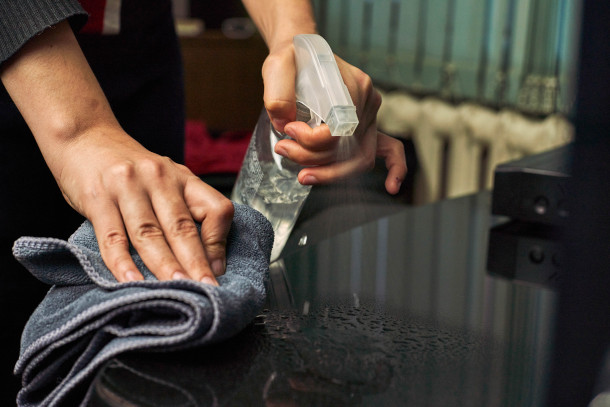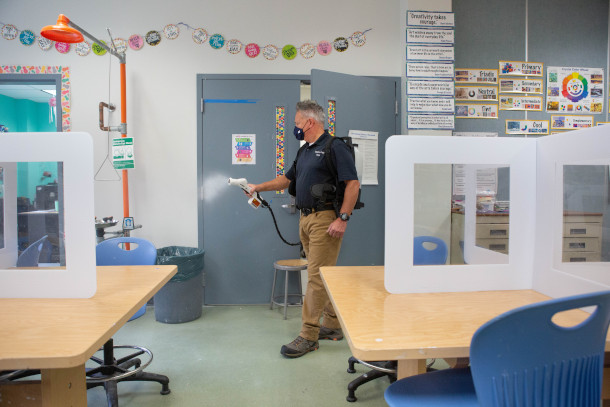The Double-Edged Sword of Disinfectants
Air Date: Week of June 9, 2023

Quaternary Ammonium Compounds, or QACs, are a class of chemicals used primarily as disinfectants. (Photo: Marco Verch, Flickr, CC BY 2.0)
New research is showing that antimicrobial chemicals called quaternary ammonium compounds (QACs), which are widely used in disinfectants, pesticides and personal care products, are linked to numerous health concerns like asthma and infertility. Study co-author Dr. Carol Kwiatkowski joins Host Aynsley O’Neill to explain the gaps in regulation of these chemicals and what consumers can do to avoid them.
Transcript
CURWOOD: From PRX and the Jennifer and Ted Stanley Studios at the University of Massachusetts Boston, this is Living on Earth. I’m Steve Curwood.
O’NEILL: And I’m Aynsley O’Neill.
New research is showing chemicals commonly used to help keep us healthy may actually be double-edged swords. For example, many of us use hand sanitizer or countertop sprays to zap germs. But the overuse of some of those sprays or gels may make us sick, if they contain quaternary ammonium compounds, also known as quats or QACs. They’re chemicals used in products ranging from disinfectants to pesticides to personal care products. And while they are highly effective at killing bacteria, viruses, and fungi, a recent study in Environmental Science & Technology linked QAC exposure to health concerns like asthma and infertility. QACs can also spur antimicrobial resistance, which is a growing worry especially in light of the COVID-19 pandemic. For more, we’re joined by study co-author Dr. Carol Kwiatkowski, a Senior Associate at the Green Science Policy Institute. Dr. Kwiatkowski, welcome to Living on Earth!
KWIATKOWSKI: Thank you. Thanks for having me.
O'NEILL: So, what are these quaternary ammonium compounds, also known as QACs? And why are they used in so many products and what function do they serve?
KWIATKOWSKI: So QACs are a class of chemicals used primarily to kill germs. They're antibacterials used for disinfection in products like cleaning sprays, wipes, and hand sanitizers. They're also used as preservatives in products like cosmetics and paints, so that germs don't grow in those products. And they have other functions like softening gels in hair products and laundry products. They're also in pesticides. So there's a lot of different uses of QACs. When we were writing this paper, we created a big spreadsheet of all the uses that we could verify through different ingredient lists and labels. But there are a lot of uses that we don't even know about, actually.
O'NEILL: From what I understand, with these QACs all around, there's quite a few concerns about exposure. What do we know about the extent to which QACs harm human health and the environment?
KWIATKOWSKI: So from the products that we use, when they get sprayed, like for cleaning, or they're in air fresheners or in hair products, they're in the air, so we breathe them in, but they also are on countertops, wherever you might have sprayed them, especially if they're not wiped off. They also get on fabrics and clothing and furniture, and we touch them. So there's some absorption that happens through the skin. A lot of exposure also happens then through hand to mouth contact. So we don't really realize how much we put our hands in our mouth. And also QACs are really good at attaching themselves to dust particles. So we end up breathing them or swallowing and digesting them a lot more than you would think. QACs have been around for a long time. And some of them, you know, to it's a fairly large class, and some of them have been studied for health effects, mostly the immune system. So skin irritation, allergic reactions, asthma, inflammation. Things that when you're using a product, you don't want to have an immediate reaction to it. And all of those things have been shown to occur from QAC exposure in some settings. But more recently, there have been laboratory studies showing a variety of effects related to infertility in male and female mice, and also developmental toxicity and birth defects in their offspring. So this was only discovered by accident when one of the co authors on our paper, her lab, they changed the cleaning product that was used in the lab without her knowing. And the one they changed it to contained QACs. And these effects showed up in the animals. So she continued to study it. So this is a big concern that you know, we've seen in laboratory research but needs to be followed up with human studies to confirm. Also, there's been work done on environmental effects. So for example, there's toxicity in organisms that live in the water, like fish. And that's been demonstrated in research studies that are looking at levels that are already in the environment. So there, it's already at levels that can affect the fish. Usually that comes from contaminated wastewater that comes out of our homes or businesses or factories, things like that. One of the biggest concerns is antimicrobial resistance. So when the microbes develop resistance to the QACs, then the QACs aren't effective anymore, but also it can lead to resistance to antibiotics. And so that's where we get the development of superbugs. The antibiotics don't work. And we've in fact had research showing increases in antibiotic resistance recently post-pandemic.

Janitorial staff are among some of those most exposed to QACs, and therefore the most at risk of associated health consequences. (Photo: Allison Shelley, EDUimages, Flickr, CC BY-NC 2.0)
O'NEILL: Well, at the height of the pandemic, I remember frantically disinfecting everything from counters to cereal boxes. And I think I wasn't alone in that. And I think a lot of us were probably exposed at a pretty high level at that point. But some of that hysteria has died down now. So what populations would be still at the greatest risk of exposure?
KWIATKOWSKI: Yeah, I think some of that has died down, which is a good thing. In some places, like institutional cleaning protocols are still in place that in some cases require the use of QACs, like schools, childcare, correctional facilities, where they do a lot of repetitive cleaning, and people are continuously exposed to it. So those people are highly exposed and the people that are actually doing the cleaning, like people in occupations that use more QACs, like housekeeping, facilities, maintenance, health care, even food service. Those are areas where people would be highly exposed still.
O'NEILL: Well, I'm thinking here, in what circumstances might the use of these QACs be necessary versus when is it just overkill?
KWIATKOWSKI: So there's already, aside from QACs in particular, there's already guidance that comes from the CDC that differentiates the difference between cleaning and disinfection. And that's where you can say, and they say, you know, for general cleaning, most of the general cleaning that you do in your homes, basic soap and water is really enough. It's only in cases where people are sick, or if somebody has a compromised immune system, and maybe a stronger product is needed, that you want to do this step of disinfection, in addition to general cleaning. And even in those cases, there are a lot of alternatives to products that have QACs in them. So there are things that are made with alcohol, or citric acid, or hydrogen peroxide. And those are a lot safer.
O'NEILL: So if listeners are looking to protect themselves from products that contain these QACs, when they go shopping for cleaning supplies, what should they keep an eye out for?
KWIATKOWSKI: So I think the best thing is to look at the ingredient list and look for the words that, it might end in ammonium chloride. You know, it could be a longer word, but when you see ammonium chloride, that's a good clue. When you see antimicrobial on the package, that's also a clue that there might be QACs or other antimicrobials that aren't necessary. So I think that's the best advice I can give. Unfortunately, most, a lot of products that don't have them, you know, aside from cleaning products, don't have ingredient labels on them. So you don't really know.

Dr. Carol Kwiatkowski is a Science and Policy Senior Associate at the Green Science Policy Institute, an adjunct professor at North Carolina State University, and co-author of the quats study in Environmental Science & Technology. (Photo: Courtesy of Carol Kwiatkowski)
O'NEILL: Well, so those are some precautions that can be taken at the consumer level. What sort of protections might the state or federal governments be able to take here?
KWIATKOWSKI: Yeah, that's a good question. There aren't very many restrictions in place for QACs at this point. In some pesticides, and some labeling requirements, maybe in pharmaceutical use. But for the vast majority of products, there's not really much oversight. So consumers don't know what the products are. And even QACs that are used in one product that are restricted like in a pesticide, the same QAC can be used in a hair conditioner or a fabric softener. And it's not restricted just because of the way the government regulations work. Also, you know, we don't know what all the uses are, and if the government could require manufacturers to report usage, then we'd have a better idea of how widespread it is, and identify which ones are being used. Those can be monitored then in the environment. They can also be tested in people, so we have a better idea of you know, who's got high levels. And then I would say the most important thing that needs to happen and can be sort of pushed through at a government level is to promote the removal of unnecessary uses of QACs. All those other things I mentioned take time, but to quickly reduce the exposure and the health risks, we feel like there's enough evidence to warrant you know, messaging to the public to avoid uses of QACs unless they're necessary, you know, like only for disinfection and not put in products where they haven't been tested for, you know, whatever value they bring, and not when just general cleaning is needed.
O'NEILL: Dr. Carol Kwiatkowski is a science and policy senior associate at the Green Science Policy Institute. Dr. Kwiatkowski, thank you so much for taking the time with us today.
KWIATKOWSKI: Thank you for having me.
Links
Environmental Health News | “Scientists Warn of Disinfectant Dangers: Study”
Living on Earth wants to hear from you!
Living on Earth
62 Calef Highway, Suite 212
Lee, NH 03861
Telephone: 617-287-4121
E-mail: comments@loe.org
Newsletter [Click here]
Donate to Living on Earth!
Living on Earth is an independent media program and relies entirely on contributions from listeners and institutions supporting public service. Please donate now to preserve an independent environmental voice.
NewsletterLiving on Earth offers a weekly delivery of the show's rundown to your mailbox. Sign up for our newsletter today!
 Sailors For The Sea: Be the change you want to sea.
Sailors For The Sea: Be the change you want to sea.
 The Grantham Foundation for the Protection of the Environment: Committed to protecting and improving the health of the global environment.
The Grantham Foundation for the Protection of the Environment: Committed to protecting and improving the health of the global environment.
 Contribute to Living on Earth and receive, as our gift to you, an archival print of one of Mark Seth Lender's extraordinary wildlife photographs. Follow the link to see Mark's current collection of photographs.
Contribute to Living on Earth and receive, as our gift to you, an archival print of one of Mark Seth Lender's extraordinary wildlife photographs. Follow the link to see Mark's current collection of photographs.
 Buy a signed copy of Mark Seth Lender's book Smeagull the Seagull & support Living on Earth
Buy a signed copy of Mark Seth Lender's book Smeagull the Seagull & support Living on Earth

